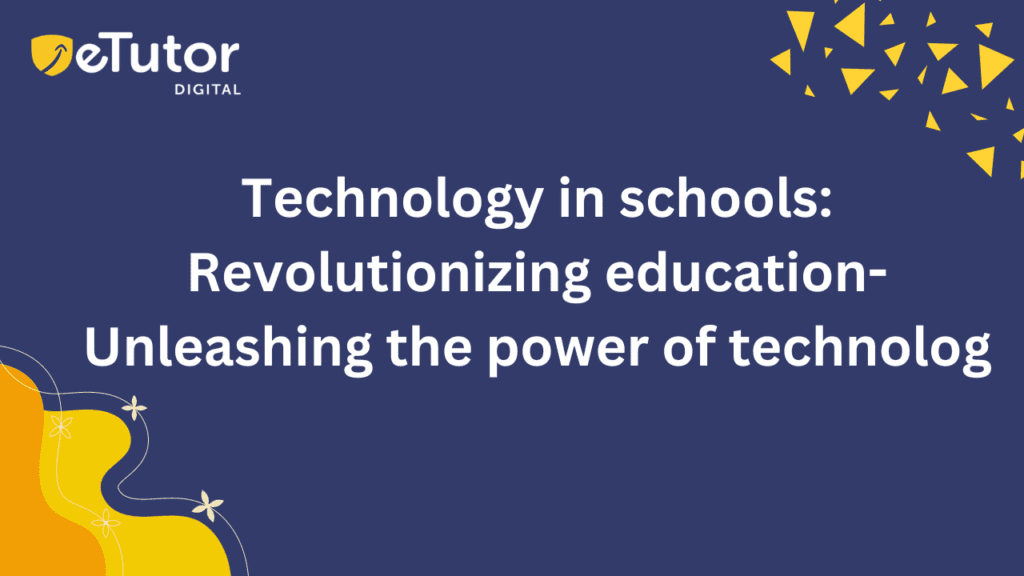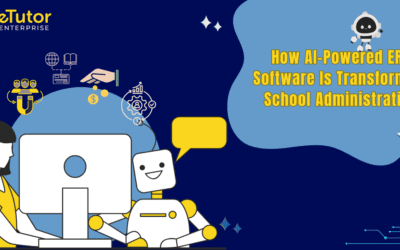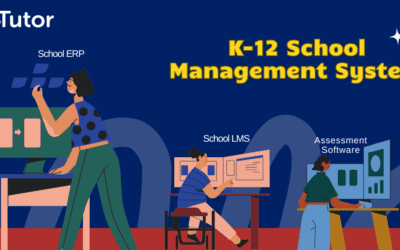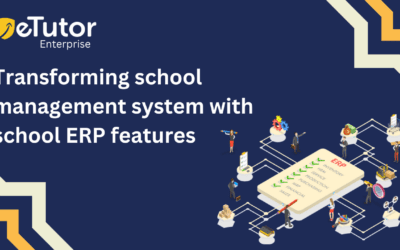Revolutionizing Technology in Schools – Shaping the Future of Learning

Technology-Driven Education: Shaping the Future of Learning:
In the fast-paced digital age, we live in an era where technological advancements shape nearly every aspect of our lives, and education is a prime beneficiary of these innovations.
Technology-driven education has revolutionized the traditional classroom, unleashing its transformative power to enhance learning experiences in unimaginable ways. As we delve into the realm of educational technology, it becomes evident that integrating technology into schools is not merely a trend but a pivotal shift towards more effective and engaging learning environments.
This blog explores the multifaceted role of technology in schools and education, highlighting its numerous benefits, challenges, and prospects.
The Evolution of Technology in Schools
Integrating technology in schools brings forth many benefits that enhance both teaching and learning experiences. By leveraging educational technology, schools can create interactive learning environments that cater to diverse learning styles and preferences.
Students are not just passive recipients of information but actively engage with content through multimedia presentations, simulations, and virtual demonstrations.
How the technology in schools transform education?
1.Enhancing Teaching and Learning
Transformative Impact of Technology in Education:
Technology has revolutionized teaching and learning, turning traditional classrooms into dynamic, interactive environments.
Interactive whiteboards, educational apps, and multimedia presentations have redefined how students engage with complex ideas, making learning more captivating and participatory.
Personalized Learning Experiences:
At eTutor Digital, we help IIT-JEE & NEET aspirants with the outstanding adaptive practice dashboard. They can check their performance based on the score, accuracy, and speed.
Our eTutor platform customizes learning paths for each student, allowing them to progress at their own pace.
Instant feedback helps students focus on areas needing improvement, enhancing their learning outcomes and catering to individual learning styles.
Access to Extensive Educational Resources:
The internet serves as an invaluable repository of knowledge, offering students limitless access to digital textbooks, online libraries, and educational websites.
This wealth of resources empowers students to explore diverse subjects, conduct in-depth research, and gain profound insights into their studies.
2.Enhancing Student Engagement with Technology:
Bridging the Gap: Remote and Online Education
The COVID-19 pandemic accelerated the adoption of remote and online learning, highlighting their indispensable role in overcoming geographical barriers and ensuring continuity of education. These modalities offer flexibility and convenience for students, accommodating diverse schedules and preferences while promoting lifelong learning opportunities.
Empowering Educators
Our eTutor ERP platform empowers educators through:
Technology automates grading, attendance management, and other administrative duties, allowing teachers to allocate more time to direct instruction and student support.
Online courses, webinars, and virtual conferences offer educators opportunities for continuous professional growth. These platforms facilitate staying updated with the latest teaching methodologies and advancements in education.
Overcoming Challenges and Concerns
Despite its advantages, integrating technology in education requires addressing challenges such as ensuring equal access to technology, navigating privacy and security considerations, and maintaining a balance with traditional teaching methods to foster holistic development.
Embracing Technological Innovations
Looking ahead, technological innovations like Artificial Intelligence (AI), virtual and augmented reality (VR/AR), and the Internet of Things (IoT) hold immense promise for transforming educational landscapes. These advancements enable immersive learning experiences, personalized tutoring, and enhanced educational outcomes.
Future Perspectives: The Role of Technology in Education
As advancements in educational technology continue to unfold, they empower educators and learners alike, fostering a culture of innovation and lifelong learning. Embracing these changes ensures that education remains adaptive and responsive to the needs of future generations.
Conclusion
In conclusion, integrating technology in education holds a transformative era, offering unparalleled opportunities to enhance teaching effectiveness, increase student engagement, and prepare learners for success in the digital age.
By embracing technological advancements, educational institutions can cultivate environments where creativity, collaboration, and critical thinking thrive, shaping the future of education worldwide.
Whether in schools, classrooms, or online platforms, technology-driven education is not merely a trend but a fundamental shift towards empowering individuals and communities through knowledge and innovation
Recent Posts
- NTA-Based Hybrid Assessment Software for IIT-JEE Mains, Advanced & NEET
- eTutor Offline Exam Software for IIT-JEE, NEET, and Foundation with Student Performance Analytics
- NEET Test Generator for Academies & K-12 Schools
- How School ERP Software Maximizes Productivity and Minimizes Cost
- How Does ERP Software for Schools Help Educators?







